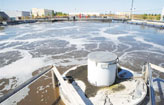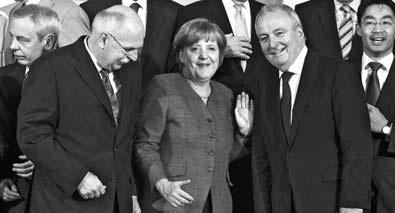Diplomatic and Military Affairs
Germany to scrap nuke power by 2022
Updated: 2011-05-31 07:28
By Zhou Wa (China Daily)
|
German Chancellor Angela Merkel and other officials pose for photographers at the chancellery in Berlin on Monday. John Macdougall / Agence France-Presse |
Beijing - German Chancellor Angela Merkel's ruling coalition agreed on Monday to shut down all of the country's nuclear reactors by 2022.
Following Japan's nuclear disaster in March, the coalition decided to keep the eight oldest of Germany's 17 nuclear reactors permanently shutdown.
Seven of the eight reactors were closed in March right after an earthquake and tsunami hit the Fukushima Daiichi nuclear power plant.
Another six will be taken offline by 2021, German Environment Minister Norbert Roettgen said after talks in the chancellor's office among leaders of the coalition.
The remaining three newest reactors will stay open for another year until 2022 to ensure no disruption to power supplies, he said.
Analysts said the German plan would not influence global cooperation in nuclear safety.
Germany is a leader in nuclear technologies and still has 11 years to undertake the transition, so it can still cooperate with other countries in nuclear safety, said Liu Liqun, an expert in German studies from Beijing Foreign Studies University.
"Germany's move will not influence international nuclear safety cooperation. The international community is likely to build an effective cooperative mechanism within the framework of the International Atomic Energy Agency," said Shao Beibei, a nuclear studies expert at Tsinghua University.
In 2002, under then chancellor Gerhard Schroeder, the German government decided to end nuclear power generation in the country by 2022, but in 2010 the Merkel government amended the plan to extend the lifetime of the nations' nuclear plants - with the last scheduled to go offline in 2036.
However, the German government's attitude toward nuclear power changed after the nuclear disaster in Japan.
Analysts said it was unlikely that other nations would also move to scrap nuclear power.
In Germany, nuclear power plants supplied some 22 percent of the nation's energy needs in 2010, compared to around 80 percent in France, the world's most nuclear dependent country.
There is no need for the United Kingdom to curtail the operation of its nuclear power plants in the wake of Japan's nuclear disaster, nor should it change its plans for new nuclear plants, according to an earlier report by Mike Weightman, the UK's chief inspector of nuclear installations.
Weightman said that the UK is unlikely to see similar seismic activity as it is about 1,600 kilometers from the edge of a tectonic plate, and the designs of its 19 reactors are different from those at Fukushima.
Liu Liqun said that Germany's decision to scrap nuclear power means it has to find other sources of energy to fill the gap.
Rising power prices may also drive up manufacturing costs, damaging the competitiveness of German-made goods, Liu added.
"To deal with the problem, Germany has to make vigorous efforts to develop new energy and even import power from other European countries," Liu added.
Reuters, Zhang Chunyan in London and Wang Jiabao in Beijing contributed to this story.
China Daily

E-paper

Tapping into the future
Foreign companies are investing in China's water industry as many predict a growing profit margin.
Preview of the coming issue
Headhunters ride on growth
Commercial property rides wave
Specials

China Daily marks 30th birthday
China's national English language newspaper aims for a top-notch international all-media group.

Cuisine central
London's Chinatown is helping diners appreciate full palate of Chinese food

Tying the knot
Danish couple's high-end macrame export business takes off in the mountains of Yunnan.

